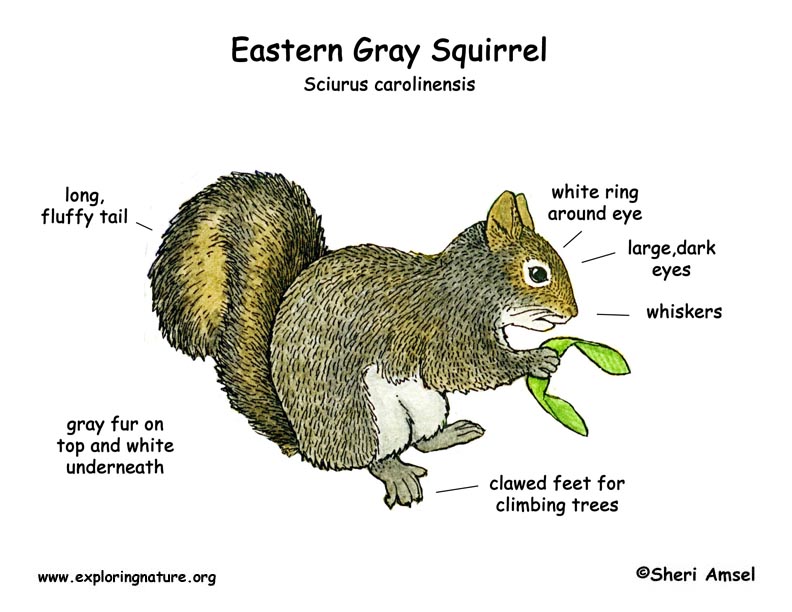

The Eastern gray squirrel is found in eastern Canada and U.S. and down through the Midwest into Iowa, Kansas and Texas. It has been introduced to habitats on the west coast too.
Eastern gray squirrels are found in hardwood and mixed forests as long as there are trees that produce nuts. They especially seem to like oak and hickory nuts.
They are gray with lighter fur on their bellies. They have a flurry tail with silver tipped hairs. There is also a black phase of this squirrel in the northern part of its range. They are about 9 inches tall and weigh about 2.5 pounds.
Eastern gray squirrels are active in the daytime (diurnal), especially in the morning and evening. They are active all year. Gray Squirrels den in trees cavities in the winter and leaf nests in the summer.
They eat nuts: hickory, beech, acorns, and walnuts. They bury nuts they collect, so act as tree planters.
Predators include coyotes, foxes, bobcats, hawks, owls, weasels, raccoons, and snakes.
Females are pregnant for 6 weeks (gestation) and have 2-3 young born in the spring. They may have a second litter late in the summer.
They can live between 4-7 years in the wild. They are listed as Lower Risk - least concern.
Kingdom: Animalia
Phylum: Chordata
Subphylum: Vertebrata
Class: Mammalia
Order: Rodentia
Suborder: Sciuromorpha
Family: Sciuridae
Subfamily: Sciurinae
Genus: Sciurus
Species: Sciurus carolinensis
When you research information you must cite the reference. Citing for websites is different from citing from books, magazines and periodicals. The style of citing shown here is from the MLA Style Citations (Modern Language Association).
When citing a WEBSITE the general format is as follows.
Author Last Name, First Name(s). "Title: Subtitle of Part of Web Page, if appropriate." Title: Subtitle: Section of Page if appropriate. Sponsoring/Publishing Agency, If Given. Additional significant descriptive information. Date of Electronic Publication or other Date, such as Last Updated. Day Month Year of access < URL >.
Amsel, Sheri. "Squirrel (Eastern Gray)" Exploring Nature Educational Resource ©2005-2024. December 13, 2024
< http://www.exploringnature.org/db/view/squirrel-eastern-gray >


